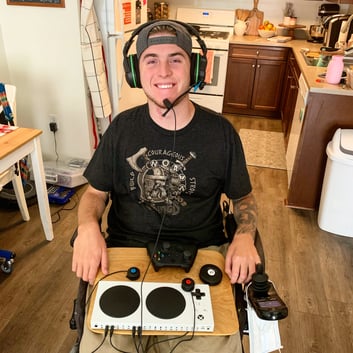Adaptive Gaming Setup - Reeve Foundation
By guest blogger Zack Collie
Before my accident happened, one of the many activities I enjoyed doing was playing video games. I remember the day my dad brought home the very first Xbox and Halo game when they came out. After playing Halo for the first time, I was hooked. Ever since then, I have enjoyed playing video games. A lot of my friends played games and we would compete against each other competitively. After my accident, I was diagnosed as a C4 incomplete quadriplegic and lost all function in my wrists and hands. I tried my best to play video games again, but it wasn’t the same. I couldn’t play the fast pace shooter games that I played with my friends before. I love to play against real online players. It is so much more rewarding beating a live player than playing against a computer. It was even more frustrating to me because I knew how good I used to be and couldn’t play that way anymore. If I couldn’t play well, I didn’t want to play at all. I eventually accepted the fact that my video gaming days were over, or at least that is what I thought.
In 2018, Microsoft came out with this adaptive gaming controller that allows individuals with physical disabilities to be able to play video games. This adaptive controller was a game-changer for the disabled community. At the time, I hadn’t played video games in years and was busy with school. It wasn’t until COVID-19 hit when I had the thought to try gaming again. I figured since I have to stay inside, I might as well do something that entertains me, and I wanted to feel like a kid again and relive some of my childhood memories. After doing some research and watching a few YouTube videos, I decided to give it another try. I ordered an Xbox, the Microsoft adaptive controller, and Logitech’s adaptive gaming kit. The adaptive controller is a white rectangle with two big buttons and has these ports all along the backside of it that allows you to plug in external buttons. All the ports are the different controls of the Xbox controller (A, B, X, Y, RB, LB,) ext...
The adaptive gaming kit comes with all different kinds and sizes of buttons. All of them are very sensitive and easy to push. Everyone’s setup is going to be unique in their own way based on their preferences. My setup is for shooting games, mainly Call of Duty. It is a little difficult for me to explain my set up so see the picture attached to see my personal gaming set up. I like to play competitive shooting games and couldn’t figure out how to shoot. Normally you use the trigger (RB) on the controller, but because I don’t have finger function, I can’t pull the trigger. Thankfully, because of the adaptive controller and gaming kit. I can plug a button into the adaptive controller (RB) port and put the button in my mouth to bite down on to shoot. I have a small wood board that goes on my lap. I use Velcro to hold down the controller to the board. Underneath the adaptive controller, I have the original Xbox controller, where I rest my hands on the joystick to move around. Then I have the external buttons plugged into the adaptive controller and put them near my hands so I can easily push them with my knuckles. Everything is Velcroed to my board, so nothing slides around. Because of this advanced technology, I am able to play video games and relive my childhood memories. I can play completely on my own and the great thing about the adaptive controller is that it works with Xbox, PlayStation, and computers.
Zack Collie is living with quadriplegia and was paralyzed in 2010 diving under a wave at Newport Beach breaking his C-4 vertebrae. Zack started a YouTube channel to spread awareness about spinal cord injuries and his life living as one. His mother, Amber Collie, is also a regular blogger for the Reeve Foundation.
Join Our Movement
What started as an idea has become a national movement. With your support, we can influence policy and inspire lasting change.
Become an Advocate